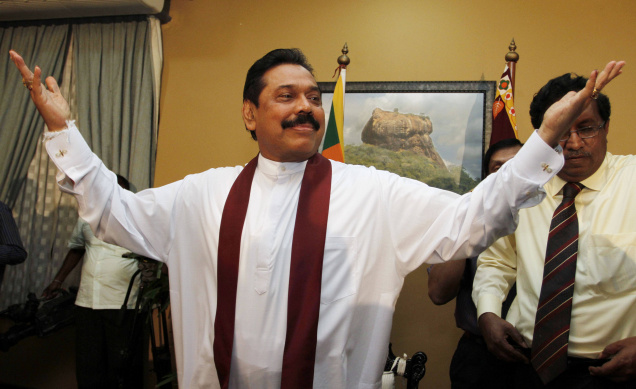|
Sri Lanka’s opposition talked of giving concessions to the country’s defeated Tamil minority. The Sinhalese majority said no. Melanie Gouby analyses Sri Lanka’s presidential election.
 For all the talk of a close election, in the end President Mahinda Rajapaksa was re-elected comfortably when results were announced on Wednesday. General Sarath Fonseka, the former head of the Sri Lankan army and Rajapaksa’s main opponent, lost with 40.15 per cent of the vote amid questions over the fairness of the elections. For all the talk of a close election, in the end President Mahinda Rajapaksa was re-elected comfortably when results were announced on Wednesday. General Sarath Fonseka, the former head of the Sri Lankan army and Rajapaksa’s main opponent, lost with 40.15 per cent of the vote amid questions over the fairness of the elections.
Indeed, Dayananda Dissanaoke, the Elections Commissioner, announced that he would resign following the election as he felt his directives had not been respected by the state media and the government.
“He is not satisfied with the state media and the authorities, who did not follow his instructions regarding how the state media should handle the coverage of the campaign. It is a disappointment,” said a consultant at the Department of Elections.
Although the opposition has claimed votes were rigged, so far no proof has been put forward. “I think the elections itself were transparent. It is the way the campaign was reported by the state media that is an issue,” said the consultant.
Rajapaksa had called the election early in order to bank on his victory against the Liberation Tigers of Tamil Eelam (LTTE), the guerrilla movement that divided the island for over thirty years, but his plan seemed to be seriously jeopardised when victorious former army chief General Fonseka decided to run against him.
With the Sinhalese population apparently equally split between the two contenders, it seemed the Tamil minority would decide the victor. But a close look at elections results shows that Fonseka’s gamble to woo Tamil voters actually turned against him.
Indeed, while he won by a large margin in Tamil-heavy districts such as Vanni and Jaffna, and had a strong argument as the “national hero” and military mind behind the victory over the LTTE, Fonseka could not convince the Sinhalese majority that he would deliver as president.
“To me it seems obvious that he would not win. He said he would make concession to Tamils – although very small, that’s enough to put off many people here,” said Sudesh Jayarante, a 25-year-old Sinhalese engineer living near Colombo.
Fonseka’s hotel in Colombo, the luxurious Cinnamon Lakeside Hotel, was also surrounded by nearly a hundred soldiers on Wednesday for reasons that remain obscure.
Fonseka, as former leader of the national army, retains loyalty within the troops he led to victory last April, and it seems Colombo authorities may have feared he would rally soldiers and attempt to seize power on grounds of electoral fraud.
Numerous accusations that the other side might attempt a coup were made during the campaign, and international observers feared that clashes between partisans of the two candidates would occur following the election results. But the streets of Colombo remained relatively calmed yesterday.
The campaign was also marked by mutual accusations of responsibility for war crimes during the final decisive attack against the Tamil Tigers. Fonseka had taken a strong stance, claiming he would allow the military campaign to be scrutinised by an international commission.
But Rajapaksa never made concessions on either war crimes or the Tamils’ yearning for self-determination.
In spite of the effect created by Fonseka’s surprise candidacy, Rajapaksa’s campaign remained in line with his policy against the Tamil rebellion, and his refusal to make concessions secured him Sinhalese votes, and victory.
Rajapaksa also appealed to a section of the Tamil population. The Guardian quoted a Tamil truck driver from Jaffna on Sunday, saying: “When the war was going on, we suffered enormously at the hands of both pro-LTTE and pro-government groups. But all that ended with the elimination of the LTTE. Although many young people want a change we who have seen much in life strongly believe that credit goes to the president.”
Rajapaksa has thus been re-elected for a six-year term, and today Maithripala Sirisena, a minister in his government, announced the president would shortly dissolve parliament to ensure he holds a strong majority.
With an unchallenged second mandate, a country free from terrorism and a strong majority in Parliament, Rajapaksa will have free rein.
Given that his first term as president was characterised by corruption, nepotism and attacks on journalists that led Reporters Without Borders and Transparency International to include Sri Lanka in their respective lists of “troubled” countries, this is not something the Sri Lankan opposition and media will look forward to.
|





 For all the talk of a close election, in the end President Mahinda Rajapaksa was re-elected comfortably when results were announced on Wednesday. General Sarath Fonseka, the former head of the Sri Lankan army and Rajapaksa’s main opponent, lost with 40.15 per cent of the vote amid questions over the fairness of the elections.
For all the talk of a close election, in the end President Mahinda Rajapaksa was re-elected comfortably when results were announced on Wednesday. General Sarath Fonseka, the former head of the Sri Lankan army and Rajapaksa’s main opponent, lost with 40.15 per cent of the vote amid questions over the fairness of the elections.